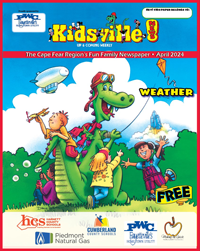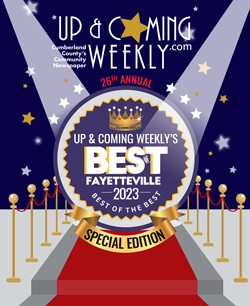Letters to the Editor
- Details
Dear Ms. Burton:
I am sure thousands of parents in our state relate to your feelings concerning the end-of-course test your son will be subjected to later this academic year. Many teachers and their students become fearful and apprehensive regarding end-of-course tests every year.
The history of the end-of-course is complicated. I was fortunate to work for the Department of Public Instruction from 1970 until 1979 and then for the next 19 years as the science curriculum specialist for the Cumberland County Schools. In those two positions I was actively involved in the development for the state science curriculum and peripherally in the development of the end-of-course and end-of grade tests during those years.
The process leading to the imposition of the state curriculum and testing program began in the early 1970s when members of the legislature compared notes related to visits in classrooms across the state. They concluded there was no pattern to instruction and asked the state superintendent to develop and publish a curriculum guide for teachers to follow in their classrooms. After some wrangling, the department published a short curriculum guide and distributed the guide to the schools in the mid-70s. The legislators hoped teachers would teach the topics in the guide at the grade level or in the junior high or high school course as they were listed in the guide. While some schools followed the suggestions, most continued teaching the way they had prior to the guide’s publication.
Several years later, after more classroom visits, members of the legislature pushed for a more detailed guide for teachers. As a result, an expanded version of the curriculum, entitled Performance Goals and Indicators, was distributed to the schools. The hope was that teachers and administrators would use the goals to design their instruction and use the indicators to design assessments. Unfortunately, as before, there was little change in what happened in classrooms across the state.
The frustration of legislators continued growing with the result that in 1985 they passed legislation requiring a significantly more detailed curriculum for all grade levels (K-12) and implementing a statewide testing program. The North Carolina Standard Course of Study, which provided detailed lists of concepts, objectives, and performance indicators in each discipline at every grade level from Kindergarten to the 12th-grade, was published as a result. An indication of the curriculum’s scope is provided by the fact that one copy of the document for grades K-12 occupied 12 feet of book shelf space. The present K-12 curriculum is essentially a modified version of the one developed in 1985 and the testing program has developed from its start to its present form by means of nearly continuous modification.
{mosimage}North Carolina wasn’t the only state to implement such a detailed curricula and assessment program. Indeed, legislatures across the nation have followed one another in trying to “stamp” out graduates in a production line type of program. The culmination of this kind of instructional program was No Child Left Behind. The result has been incredibly high levels of frustration on the part of administrators, teachers, parents and pupils. These programs have also led to the perception that our public schools are doing a poor job of educating students. In fact, the United States is the only country in the world which offers complete educational opportunities to every child regardless of ability. Hundreds of children graduate in our state each year and move on to pursue university degrees in a variety of highly technical fields. For example, five of our astronauts graduated from high schools in Bladen, Carteret, Duplin, Moore and Robeson counties.
Obviously, students who wish to study and are supported by their family can acquire an excellent education in our schools.
The majority of parent’s across the country would agree with you that the pressure of testing is totally unwarranted. The most unfortunate aspect of the testing program, as it exists in our state, is that it does virtually nothing to improve instruction. The tests do provide information concerning the overall performance of students, teachers, and schools; however, they provide no information which can be used to improve classroom instruction. The problem exists for two reasons:
First, the assessment program is required to test the entire curriculum. Teachers must teach the entire curriculum for a grade or course if their students can perform well on the end-of-grade or end-of-course tests.
So teachers are not “teaching to the test” — they, in fact, do so by simply teaching the curriculum. The size of the curriculum has continued to grow and the resulting growth of the material to be taught has made it basically impossible for a teacher to cover what he or she is supposed to teach in a semester or an academic year. This is particularly true in the case of high school courses. In every tested course there are too many concepts to be covered in the time allotted. As a result much of the instruction has reverted to a mode many of us think of as read the chapter, answer the questions, take the test. In essence, the middle and high school curricula are best suited to students who are most proficient at memorizing and regurgitating information. This problem is reflected by the constantly increasing size of textbooks which now weigh so much that they present back injury hazard to students who attempt to take more than two home at one time.
The problems are different in elementary grades where teachers are supposed to be able to teach reading, writing, mathematics, science and social studies with equal facility. On its face such a challenge is impossible to accomplish. At the same time, our teachers have become recipients of students with all the problems in our society. There is no way one teacher, even with an aide, can provide all the individualized help today’s students require and teach them the skills they must master to succeed on end-of-grade tests.
Second: the present end-of-grade and end-of-course tests are required to test every concept listed in the curriculum for a specific subject at a given grade level or a specific course. As a result on any given test there can be no more that three to five questions on each major concept.
In most cases only two or three questions address a specific concept. The number of questions related to one specific concept is too small to provide a statistically valid measure of the student’s understanding of that concept . Without such information, teachers and administrators cannot use the test results to find and correct instructional problems.
In spite of a number of efforts to change the kinds of questions on the tests, virtually all the questions are specific problems in mathematics or content-recall questions in science and social studies. Even if teachers desire to teach students by having them explore an idea or investigate a phenomenon, the nature of the questions on the tests require that they have their students memorize information.
The students we are graduating lack the reasoning and teamwork skills industry is seeking because there simply isn’t time to teach those skills while covering an “overstuffed” curriculum. Across our state many educators are struggling to find ways to prepare students for success in the adult world while trying to deal with a curriculum and assessment program which work against their best efforts.
Parents across our state need to do more than simply worry about how their students will do and react to the state testing program — they need to write their legislators and demand that:
• The curriculum be reduced to a size that can be taught by inquiry and exploration in the present school year.
• That both the curriculum and assessments be revamped in ways which recognize the impossibility of using memorization to cope with the knowledge explosion by promoting reasoning, problem solving, and teamwork.
• The assessment program be changed to provide information primarily designed to help teachers and schools improve instruction rather than simply making legislators and board members feel that they have succeeded in evaluating each individual school’s performance.
Fred L. Beyer Jr., Fayetteville

 How to resolve AdBlock issue?
How to resolve AdBlock issue? 









